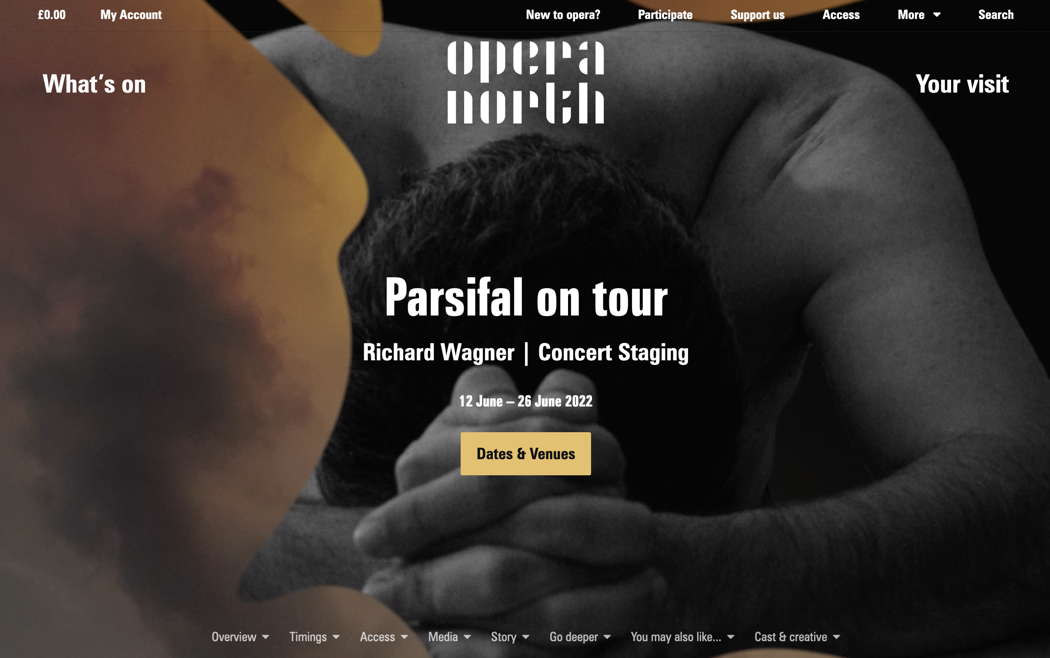- Madame Butterfly
- Schuman
- Benedetto Marcello
- harpsiplonk
- Roussel
- Donizetti: Anna Bolena
- Resounding Echoes
- Aydin
 DISCUSSION: John Dante Prevedini leads a discussion about Composers, individuals or collective?, including contributions from David Arditti, Halida Dinova, Robert McCarney and Jane Stanley.
DISCUSSION: John Dante Prevedini leads a discussion about Composers, individuals or collective?, including contributions from David Arditti, Halida Dinova, Robert McCarney and Jane Stanley.
 UPDATES: There's a new feature every day at Classical Music Daily. Read about the various ways we can keep in touch with you about what's happening here.
UPDATES: There's a new feature every day at Classical Music Daily. Read about the various ways we can keep in touch with you about what's happening here.
Deeply Mystical Intentions
Wagner's 'Parsifal', on tour with Opera North, heard by MIKE WHEELER
I really don't know what to make of Parsifal. Yes, Wagner's last opera takes on some big issues: suffering, redemption, purity, compassion. But it does so at often inordinate length, with long stretches that are, frankly, dull - there's often such a lot of back-story to sit through in Wagner - not to mention the text's strong tendency to sink into the kind of windy verbosity that gives mysticism a bad name.
But of course things are not as black-and-white as that, so let's focus on the positives in Opera North's concert performance - Royal Concert Hall, Nottingham, UK, 15 June 2022. For a start, there was the welcome return of the company's former music director Richard Farnes (who went out in a blaze of glory with a complete Ring cycle six years ago). It's not disparaging the singers in any way to say that in some respects he and the Opera North orchestra were the stars of the performance.

Richard Farnes. Photo © Jack Liebeck
The Prelude was spacious and unhurried, with woodwind subtly colouring the string lines. (Wagner's orchestration has always been justly admired.) As Amfortas expressed his vision of the Holy Grail and his feelings of unworthiness, towards the end of Act I, the duality was vividly underlined, with the strings giving out a real sense of the 'holy glow' he described, while wind and brass articulated his anguish. There was a palpable sense of tension as the two squires see Kundry riding towards them near the start of Act I, and the Prelude to Act II positively seethed with menace. Climaxes were given all the room they needed for full intensity; Klingsor's kingdom collapsed, in Act II, with tremendous impact.
Brindley Sherratt established Gurnemanz's authoritative presence right from the start, while Robert Hayward's Amfortas was a vivid study in both physical and mental pain, moving in his Act III world-weariness. Katarina Karnéus' richly- but not matronly-toned mezzo explored every facet of Kundry's character: by turns hard-bitten, achingly regretful, and tender as she describes to Parsifal the mother he never knew. In the title role, Toby Spence was convincingly youthful both visually and vocally, his white top a striking contrast to the all-black worn by the rest of the cast. In Act I he looked permanently bewildered – as well he might, as the innocent fool who has stumbled into the Grail Knights' closed world, and ends up unwittingly holding the key to healing Amfortas' wound – in contrast to the confident assurance of his Act II entry. When a heroic ring to the voice was called for, it was there. As Klingsor, Derek Welton acted well with the voice but tended to fall back too readily on off-the-peg 'mean-and-nasty' facial expressions.
Ivan Sharpe and Richard Mosley-Evans gave solid support as the two Grail Knights, as did Squires Claire Pascoe, Molly Barker, Stuart Laing and Campbell Russell (and it was always worth keeping an eye on their reactions, when they weren't singing); Samantha Clarke, Kathryn Stevens, Victoria Sharp, Elin Pritchard, Miranda Bevin and Helen Évora were the suitably flirtatious Flower Maidens.
The visual element of Sam Brown's production – on show when it was first staged at Opera North's home, the Grand Theatre, Leeds – was very much trimmed back for the subsequent tour. A row of chairs in front of the orchestra for the soloists was the only staging, but there was enough in the way of movement, expressive gesture and facial expression to communicate the characters' interactions. From the seats above and behind the orchestra, the chorus produced a solid, rich sound; behind them appeared the off-stage brass and Stephen Richardson's both commanding and wraith-like Titurel. Hazel Croft's clarion Voice from Above (at the end of Act I) rang out from a side balcony.

Online publicity for Opera North's Parsifal on Tour'
So there it is. Are Wagner's deeply mystical intentions undermined by portentous self-indulgence? I suspect that, for me, the question will long remain open.
Copyright © 24 June 2022
Mike Wheeler,
Derby UK



